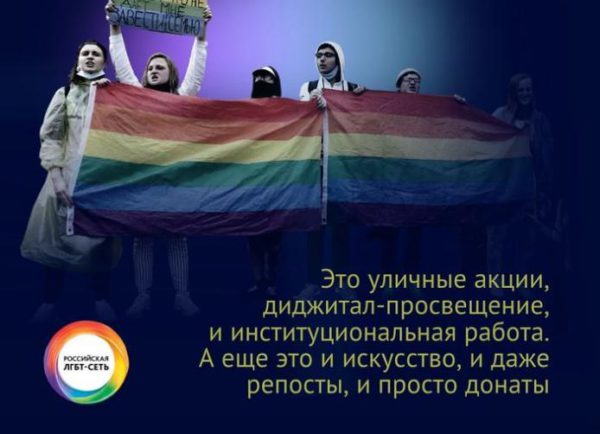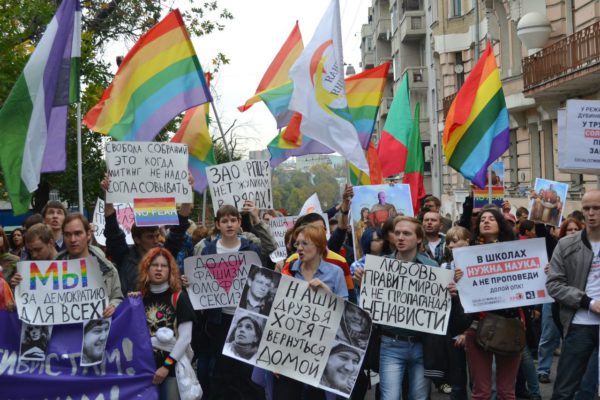This past Monday, the Russian Ministry of Justice included the Russian LGBT Network and five lawyers from the recently dissolved human rights group, Komanda 29 (Team 29), including its founder Ivan Pavlov, a prominent lawyer, on the list of “foreign agents.”
This latest move by Russian authorities is continuing a months-long crackdown on activists, opposition supporters and independent media. The government has designated a number of independent media outlets, journalists and human rights groups as “foreign agents.” At least two disbanded to avoid a further crackdown.
The Russian LGBT Network has advocated for civil rights in Russia since 2006 and has 17 branches across the country. The group is well-known both in Russia and abroad for its effort to rescue gay men and lesbians from Chechnya.
They played a crucial role in the exposure of a brutal “anti-gay” campaign in Chechnya during which dozens of men were abducted, tortured and several believed to have been killed for their real or perceived sexual orientation. The group also provided shelter for victims of homophobic attacks from Chechnya and elsewhere around the country, and helped with their relocation to safer locations within and outside Russia.

“We don’t know why we have been declared a ‘foreign agent.’ The Russian LGBT Network disagrees with this status. We are not involved in political activities, we offer legal and psychological aid (and) defend the rights of the LGBT+ community,” the statement on the group’s Facebook page read. The statement added that the group would continue to operate and contest the designation in court.
Team 29, was an association of lawyers and journalists specializing in treason and espionage cases and freedom of information issues. Team 29 shut down earlier this year, fearing prosecution of its members and supporters, after authorities accused the group of spreading content from a Czech nongovernmental organization that had been declared “undesirable” in Russia.
Ivan Pavlov and his colleagues have courageously provided help to civil society and political activists and groups that have been targeted by the authorities, including Aleksei Navalny’s Anti-Corruption Foundation.
In April, Russian authorities launched a criminal case against Pavlov, who was representing a former Russian journalist accused of treason. They accused Pavlov, who has since left Russia and resettled in Georgia, of disclosing information related to a police investigation, the Associated Press reported.

Natalia Zviagina, Amnesty International’s Moscow Office Director, in a statement released to international media outlets said:
“Beyond shameful, the justice ministry’s decision reveals that committed, principled lawyers defending the rights of people targeted in politically motivated cases and frontline LGBTI rights defenders are unwelcome and ‘foreign’ in Putin’s Russia.
“LGBT-Network has exposed heinous crimes against gay men in Chechnya and helped evacuate people at risk to safety where they can speak about these atrocities. Now LGBT Network is, itself, a victim of the persecution that is being increasingly targeted at all human rights defenders—openly, viciously and cynically.
“The authorities cite the need to protect ‘national interests’ and resist ‘foreign influence’ in their incessant destruction of Russia’s civil society. But what’s really in the national interest is to protect, uphold and respect all human rights for everyone.
“These reprisals against human rights defenders and civil society organisations must stop, and the ‘foreign agents’ and ‘undesirable organisations’ laws must be repealed immediately.”
In an article published this past July, RadioFreeEurope/RadioLiberty’s correspondent Todd Prince explains that a Council of Europe legal advisory body has sharply criticized recent Russian amendments to laws regulating so-called ‘’foreign agents,” saying they constitute “serious violations” of basic human rights and will have a “chilling effect” on political life.
In a report analyzing the amendments, published on July 6, the Venice Commission, which is composed of independent experts in the field of constitutional law, called on Russia to reverse aspects of its “foreign agents” laws such as registration and reporting requirements, or alternatively revise “the entire body” of the legislation by narrowing the definition of a “foreign agent.“
The commission warned in its 26-page report that the amendments will have a “significant chilling effect…on the free exercise of the civil and political rights which are vital for an effective democracy.”
It further said the broadened scope of the “foreign agents” legislation allows authorities “to exercise significant control over the activities and existence of associations as well as over the participation of individuals in civic life.








